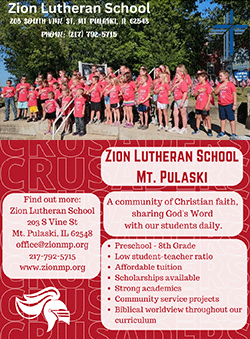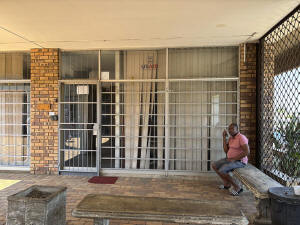Africa knew Trump's 'America First' pledge meant it might be last. Then
came the freeze on aid
 Send a link to a friend
Send a link to a friend
 [February 03, 2025]
By GERALD IMRAY, MOGOMOTSI MAGOME, FARAI MUTSAKA and MARK
BANCHEREAU [February 03, 2025]
By GERALD IMRAY, MOGOMOTSI MAGOME, FARAI MUTSAKA and MARK
BANCHEREAU
JOHANNESBURG (AP) — Four days after President Donald Trump signed an
executive order freezing almost all U.S. foreign aid, an email landed in
Claris Madhuku's inbox in rural Zimbabwe. Stop all activities
immediately, it said.
The message confirmed Madhuku's fears that Trump's return to office
might affect his organization's efforts to save African girls from child
marriages.
Many Africans had known that Trump’s “America First” outlook meant their
continent was likely to be last among his priorities. But they hadn't
expected the abrupt halt to foreign aid from the world's largest donor
that stops money flowing for wide-ranging projects like disease
response, girls' education and free school lunches.
Even after global outrage prompted some exemptions to Trump's order,
sub-Saharan Africa could suffer more than any other region as most
global aid pauses 90 days for a spending review. The U.S. gave the
region more than $6.5 billion in humanitarian assistance last year.
For Madhuku and countless others, the damage has been done. His Platform
For Youth and Community Development is one of hundreds of small
non-governmental organizations in Africa that receive assistance from
the U.S. government — and ultimately from the American people — to do
good work.
Without U.S. aid, Madhuku's group can't give around 100 volunteers
allowances for food and public transport as they do outreach seeking to
keep girls in school and out of early marriages.

“We had to stop everything, no warning, no time to adjust," Madhuku
said. “I appreciate that Trump might have some justification in trying
to account for American taxpayers’ money ... but it has caused disaster
here.”
The world's most successful foreign aid program
For many in Africa, thoughts immediately turned to arguably the world's
most successful foreign aid program, the President’s Emergency Plan for
AIDS Relief, or PEPFAR.
Over two decades, the program with bipartisan support has been credited
with saving more than 25 million lives, the vast majority in Africa, the
continent it was designed to help most.
“The world is baffled,” the health minister of South Africa, the country
with the most people living with HIV, said after the U.S. freeze on aid.
The minister, Aaron Motsoaledi, said the U.S. funds nearly 20% of South
Africa’s $2.3 billion annual HIV/AIDS program through PEPFAR, and now
the biggest response to a single disease in history is under threat.
More than 8 million in South Africa live with HIV, and authorities say
PEPFAR helps provide life-saving antiretroviral treatment to 5.5 million
people every day.
HIV patients are turned away
U.S. Secretary of State Marco Rubio has announced that programs offering
“life-saving” assistance including medicine, medical services, food and
shelter would be exempted from the aid freeze, though what qualifies is
not immediately clear.
The United Nations AIDS program said many organizations receiving PEPFAR
funding had closed due to the aid pause and there was "lack of clarity
and great uncertainty about the future.” More than 20 million people
globally receive HIV treatment with PEPFAR support, UNAIDS said.
In South Africa's largest city, Johannesburg, and elsewhere, PEPFAR-funded
facilities were still shut days after the exemptions were announced and
HIV patients were referred to government hospitals and clinics.
[to top of second column]
|

A man sits outside the closed Isizinda Sempilo clinic in the
Johannesburg township of Soweto Thursday, Jan. 30, 2025. (AP
Photo/Alfonso Nqunjana)

In Johannesburg's largest township, Soweto, two workers at the
PEPFAR-funded HIVSA center turned patients away. And a notice at the
renowned Wits RHI Key Populations Clinic, which serves adults and
children living with HIV, read: “We apologize for the inconvenience
this causes."
Delays could be dangerous
Experts said the effects on HIV programs remain unclear but the
consequences could be swift, even dangerous.
"We need to know a lot more before we can say people won’t die
directly because of the pause to funding,” said Charles Kenny, a
senior fellow at the Center for Global Development in Washington,
noting that while the waiver should cover HIV drugs, HIV diagnostic
tests are also critical to ensure treatment gets to those who need
it.
Kenny said even short interruptions to antiretroviral treatment —
which stops the virus replicating in the body — are risky.
“HIV viral loads rebound in about three weeks if you go off
antiretrovirals,” he said.
Overall, even senior officials in the aid community are not sure
which U.S.-funded programs are allowed to at least briefly continue
operations.
The Trump administration has warned contractors and staffers with
USAID — the agency responsible for dispersing America’s foreign aid
— they could be disciplined if they speak to anyone outside the
agency without top-level approval, and aid groups fear they may
permanently lose funds if they speak publicly.
Stopping aid in war zones
A humanitarian official told The Associated Press that at least 1.2
million people in Congo could lose life-saving support because of
the aid freeze. The official, who spoke on condition of anonymity
because they were not authorized to speak publicly on the matter,
said almost half of their organization’s funding is from USAID.
Overall, more than $100 million for the organization’s humanitarian
programs in more than 30 countries worldwide has been halted,
according to the official.
The block on aid came during a major escalation in fighting in
eastern Congo, where millions of people were already displaced and
where outbreaks of the mpox virus were declared a global health
emergency last year.
In civil-war-torn Sudan, which is grappling with cholera, malaria,
and measles, the aid freeze means 600,000 people will be at grave
risk of catching and spreading those diseases, the official said.
Even with the exemption for life-saving services, the official said
their organization had been told they should not resume any USAID-funded
activities until they received notification that the waiver applies
to them.
___
Imray reported from Cape Town, South Africa, Mutsaka reported from
Harare, Zimbabwe, and Banchereau reported from Dakar, Senegal.
Associated Press writers Maria Cheng in London, Ellen Knickmeyer in
Washington and Jacob Zimba in Lusaka, Zambia, contributed to this
story.
All contents © copyright 2025 Associated Press. All rights reserved
 |